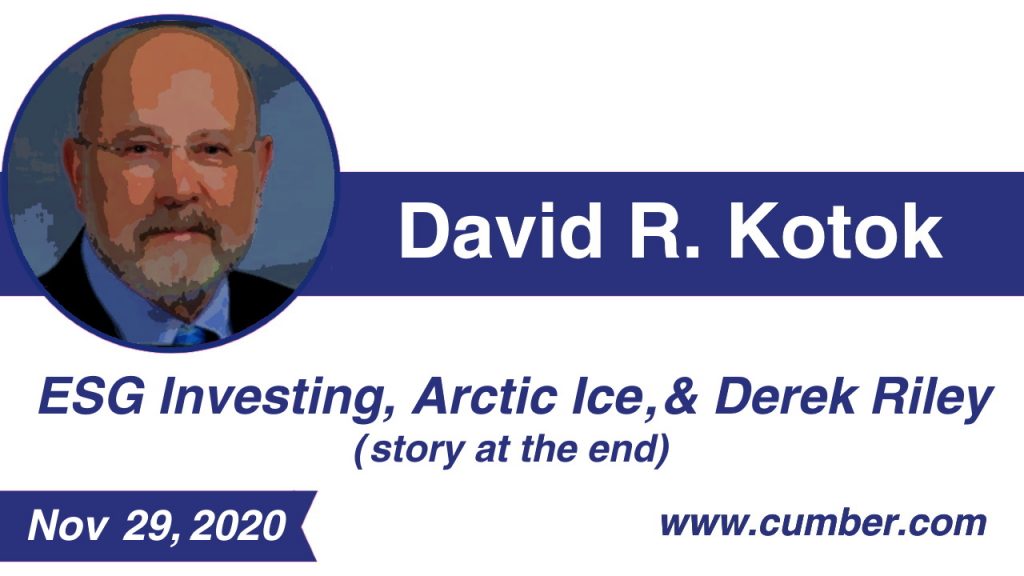We expect the new Biden administration to reverse on a massive scale Trump’s deregulation of energy and to turn strongly to sustainable-energy policy. The implications for investing in ESG are huge. Cumberland holds positions in wind, solar and water and we expect to hold those positions for a long cycle of growth. Markets are already moving to reprice this dramatic shift in policy. Anyone wishing to discuss the ESG approach at Cumberland in stocks or in bonds can email me, and I will pass the message on to the right person for discussion. Cumberland has a new as of this year, Pandemic-Affected Municipal Bond Strategy (PAMS). If you have an interest, contact us for more information about this strategy.
Here’s what’s happening in the Biden transition team on the climate agenda, from Wednesday’s edition of POLITICO Playbook:
“TRANSITION DEETS … WAPO’S MATT VISER: At the Environmental Protection Agency, acting deputy chief of staff Wes Carpenter met with the transition team’s point person, Patrice Simms. When it comes to the environment, the transition from Trump to Biden is likely to involve a dizzying effort to halt the deregulatory zeal of the past four years and to reestablish the United States as a global force for tackling climate change.
“At the Department of Justice – where some officials were privately frustrated at being unable to work with Biden’s team sooner – Lee Lofthus, the assistant attorney general for administration, was tapped to work with Biden’s agency team, led by Christopher H. Schroeder, a former Justice Department official now at Duke Law School, according to a Justice Department official.
“At the National Oceanic and Atmospheric Administration, the agency’s transition team was scheduled to hold an initial call with the Biden administration’s review committee Tuesday afternoon. NOAA leadership has prepared ‘extensive’ briefing materials on agency operations, a senior NOAA official said. Officials at the Department of Housing and Urban Development, who had previously ordered civil servants not to talk to Biden’s transition team, were scheduling meetings Tuesday and putting together a briefing book.”
(“POLITICO Playbook: Some good news ahead of Thanksgiving,” https://www.politico.com/newsletters/playbook/2020/11/25/some-good-news-ahead-of-thanksgiving-490992)
Here’s a detailed reference in the wealth management area with regard to these changes. There is a lot to absorb here, and it is well worth the time to read it.
“Will Biden Take Action on ESG Regulation?” https://www.wealthmanagement.com/regulation-compliance/will-biden-take-action-esg-regulation
Let me move to the outgoing Trump administration’s trying to make a final policy stand. We believe that any actions taken by Trump’s anti-climate colleagues will be attacked and reversed immediately when the Biden administration takes office. That means the prices that are sought by Trump’s friends and colleagues are negatively impacted right now. We expect any leasing rights they may sell will be marked down by bidders. Think about it. Would you buy something when you are headed into a massive headwind against the business model you are trying to achieve?
Let’s move north of the Arctic Circle.
As a departing action, the Trump administration is moving quickly to open up an additional 1.6 million acres of Alaska’s Arctic National Wildlife Refuge (ANWR) to oil and gas development. Doing so when there is a huge supply overhang in oil and natural gas is a questionable move. The effort to sell the drilling rights before Biden takes office is well underway, but there is pushback in the form of lawsuits filed by Native Alaskan tribes and a coalition of 15 US states.
At stake are an estimated 7.7 billion barrels of oil under the ANWR coastal plain, versus what Margorie Gemmill, First Chief of the Native Village of Venetie Tribal Government, calls “one of the most important natural, cultural, and subsistence resources to the Neets’ąįį Gwich’in of Arctic Village and Venetie and to the Gwich’in people as a whole.” She affirms, “As tribal governments, we will defend the rights of our people at all costs.”
According to Fox News,
“Despite the region being opened for drilling, it is unclear if there is a willingness on the part of companies to wade into the area amid questions about the future demand for oil and vows from large banks not to invest in the region. Several major banks, including Wells Fargo & Co. and Morgan Stanley, have announced in recent months they will pull back from supporting oil and gas projects in the refuge.”
(“Two lawsuits filed against Trump’s plan to open oil and gas drilling in Alaska’s Arctic refuge,”https://www.foxnews.com/politics/two-lawsuits-trump-oil-gas-drilling-alaskas-arctic-refuge)
Following up on the situation in the Arctic, we turn to meteorologist Jim Roemer, who has a new newsletter called Climatelligence.Here’s a link to get a sample: https://www.bestweatherinc.com/free-winter-report/. Jim focuses on commodity trading and weather-related drivers. He also provided two links from Climatelligence for us to share with readers.
The first one is a news report from Euronews on the failure of Arctic sea ice to form this October: “Arctic sea ice isn’t freezing in October for the first time on record,” https://www.youtube.com/embed/G1gXS9QYlQA&feature=youtu.be. You wouldn’t normally encounter this report in the US.


